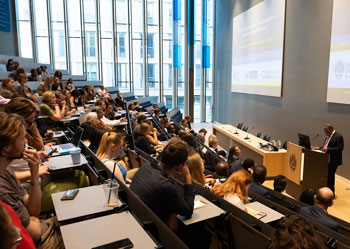News & Events
 Find the latest news below, and our event calendar on the right.
Find the latest news below, and our event calendar on the right.
Would you like to stay updated on our latest research news, publications and events? Please subscribe to our monthly newsletter!
Posted on 9 November 2011, last modified on 9 October 2023
26 November 2021
25 November 2021
Black Minds Matter tells the story of one of the most outspoken clerics of Africa, Emmanuel Milingo, who was Archbishop of Lusaka from 1969 to 1983. Milingo became widely known for his healing ministry, which was rooted in African spiritual ideas. This brought him into years of conflict with the dominant powers in the Catholic Church, and eventually led to his excommunication in 2006. Black Minds Matter was written by Gerrie ter Haar, emeritus Professor of Religion and Development at the International Institute of Social Studies of Erasmus University Rotterdam.
15 November 2021
In the past few weeks thirteen students of the Master and Research Master African Studies graduated. During an online graduation ceremony on 3 November Christen Faver, Shannon Lorimer, Femke van Zeijl and Mira Demirdirek all graduated cum laude. And on 10 November Marly van den Boom, Daniel Okiror, Bernardo Tiberi Venturucci (Research Master), Diene de Jong, Jochem Scheelings, Junyang Shen, Janina Hubmann, Marcia Semedo Gonçalvez and Samantha da Luz graduated in the Academy Building in Leiden, the last three of whom cum laude. Congratulations!
11 November 2021
The African Studies Centre Leiden has two vacancies. For the project 'Decoding Digital Media in African Regions of Conflict' (DDMAC) we are looking for a junior researcher. The key goal of the DDMAC project is to gather empirical evidence defining and demonstrating the use, spread, content and agenda setting role of social media in regions of conflicts in sub-Saharan Africa. For the Knowledge Platform INCLUDE we are looking for a student-assistant.
Pages
18 February 2026
25 August 2026 to 27 August 2026

